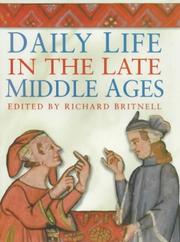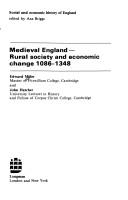| Listing 1 - 10 of 13 | << page >> |
Sort by
|
Book
ISBN: 1781664447 9781781664445 Year: 1901 Publisher: Andrews UK
Abstract | Keywords | Export | Availability | Bookmark
 Loading...
Loading...Choose an application
- Reference Manager
- EndNote
- RefWorks (Direct export to RefWorks)
Book
ISBN: 1526754061 9781526754073 152675407X 9781526754066 9781526754080 1526754088 1526754053 9781526754059 Year: 2020 Publisher: Yorkshire
Abstract | Keywords | Export | Availability | Bookmark
 Loading...
Loading...Choose an application
- Reference Manager
- EndNote
- RefWorks (Direct export to RefWorks)
Book
ISBN: 0198226578 9780198226574 Year: 1973 Publisher: Oxford: Clarendon,
Abstract | Keywords | Export | Availability | Bookmark
 Loading...
Loading...Choose an application
- Reference Manager
- EndNote
- RefWorks (Direct export to RefWorks)
England --- Nobility --- Social conditions --- History --- Social life and customs --- Nobility - Great Britain - History - To 1500 --- England - Social life and customs - 1066-1485
Book
ISBN: 0197261124 0197261132 9780197261125 9780197261132 Year: 2006 Volume: 17-18 Publisher: Oxford Oxford University Press
Abstract | Keywords | Export | Availability | Bookmark
 Loading...
Loading...Choose an application
- Reference Manager
- EndNote
- RefWorks (Direct export to RefWorks)
Nobility --- Households --- History --- Sources --- England --- Economic conditions --- Social life and customs --- Sources. --- 1066-1485 --- Medieval period, 1066-1485 --- Nobility - England - History - To 1500 - Sources --- Households - England - History - To 1500 - Sources --- England - Economic conditions - 1066-1485 - Sources --- England - Social life and customs - 1066-1485 - Sources --- HOUSEHOLD ACCOUNTS -- 930.300 --- MEDIEVAL DIET -- 930.300 --- ENGLAND -- 930.300

ISBN: 0750915870 9780750915878 Year: 1998 Publisher: Phoenix Mill: Sutton,
Abstract | Keywords | Export | Availability | Bookmark
 Loading...
Loading...Choose an application
- Reference Manager
- EndNote
- RefWorks (Direct export to RefWorks)
England --- Great Britain --- Social conditions --- Social life and customs --- History --- #VCV monografie 1999 --- -England --- -History --- -Social life and customs --- -Social conditions --- -#VCV monografie 1999 --- England - Social conditions - 1066-1485 --- England - Social life and customs - 1066-1485 --- Great Britain - History - Medieval period, 1066-1485
Book
ISBN: 0333619706 Year: 1994 Publisher: Basingstoke Macmillan
Abstract | Keywords | Export | Availability | Bookmark
 Loading...
Loading...Choose an application
- Reference Manager
- EndNote
- RefWorks (Direct export to RefWorks)
Eleanor --- Great Britain --- History --- Edward I, 1272-1307 --- England --- Social life and customs --- 1066-1485 --- Queens --- Biography --- Eleanor, - Queen, consort of Edward I, King of England, - d. 1290. --- Great Britain - History - Edward I, 1272-1307. --- England - Social life and customs - 1066-1485.

ISBN: 0521573947 9780521573948 Year: 1996 Volume: 8. Publisher: Cambridge: Cambridge university press,
Abstract | Keywords | Export | Availability | Bookmark
 Loading...
Loading...Choose an application
- Reference Manager
- EndNote
- RefWorks (Direct export to RefWorks)
Plumpton family --- Correspondence. --- England --- Great Britain --- Angleterre --- Grande-Bretagne --- Social life and customs --- History --- Moeurs et coutumes --- Histoire --- Correspondence --- Sources --- 1066-1485 --- 16th century --- House of York, 1461-1485 --- Henry VII, 1485-1509 --- Henry VIII, 1509-1547 --- Civilization [Medieval ] --- England - Social life and customs - 1066-1485 - Sources. --- England - Social life and customs - 16th century - Sources. --- Great Britain - History - House of York, 1461-1485 - Sources. --- Great Britain - History - Henry VII, 1485-1509 - Sources. --- Plumpton family - Correspondence --- England - Social life and customs - 1066-1485 - Sources --- England - Social life and customs - 16th century - Sources --- Great Britain - History - House of York, 1461-1485 - Sources --- Great Britain - History - Henry VII, 1485-1509 - Sources --- Great Britain - History - Henry VIII, 1509-1547 - Sources --- Lettres (genre litteraire) anglaises --- Moyen age
Book
ISBN: 0521095131 9780521095136 Year: 1968 Publisher: Cambridge (Mass.): University press,
Abstract | Keywords | Export | Availability | Bookmark
 Loading...
Loading...Choose an application
- Reference Manager
- EndNote
- RefWorks (Direct export to RefWorks)
English letters --- Letter writing --- History and criticism --- History --- Paston family --- Correspondence --- Paston letters --- England --- Great Britain --- Norfolk (England) --- Social life and customs --- Paston letters. --- History and criticism. --- Correspondence. --- Social life and customs. --- English letters - History and criticism --- Letter writing - History - To 1500 --- Paston family - Correspondence --- England - Social life and customs - 1066-1485 --- Great Britain - History - Lancaster and York, 1399-1485 --- Great Britain - History - Henry VII, 1485-1509 --- Norfolk (England) - Social life and customs

ISBN: 0582482186 0582485479 9780582482180 9780582485471 Year: 1978 Publisher: London: Longman,
Abstract | Keywords | Export | Availability | Bookmark
 Loading...
Loading...Choose an application
- Reference Manager
- EndNote
- RefWorks (Direct export to RefWorks)
Peasants --- Agriculture --- Paysannerie --- History --- Histoire --- England --- Angleterre --- Rural conditions --- Social conditions --- Economic conditions --- Social life and customs --- Conditions rurales --- Conditions sociales --- Conditions économiques --- Moeurs et coutumes --- (410) --- société rurale --- 500-1500 (Moyen Âge) --- 500-1500 (Moyen Âge). --- Société rurale --- 3 --- 308 --- 338 --- 63 --- 93 --- Rural conditions. --- Grande-Bretagne --- Conditions économiques --- Conditions sociales. --- England - Social conditions - 1066-1485 --- England - Social life and customs - 1066-1485 --- England - Economic conditions - 1066-1485 --- England - Rural conditions
Book
ISBN: 9781108424028 9781108539579 9781108439329 1108439322 Year: 2019 Volume: n°114 Publisher: Cambridge Cambridge University Press
Abstract | Keywords | Export | Availability | Bookmark
 Loading...
Loading...Choose an application
- Reference Manager
- EndNote
- RefWorks (Direct export to RefWorks)
"Introduction: Since the 1960s historians studying gift giving have significantly deepened and nuanced our understanding of social, political and religious relations in medieval Europe. From the outset, historians have tended to see gift giving in terms of 'folk models.' In this they have been following in the footsteps of the social anthropologists from whom we have inherited the analytical apparatus of 'gift giving.' The founding father of gift-studies, Marcel Mauss, in his Essai sur le don, presented reciprocal gift exchange as a characteristic feature of archaic societies, found in its clearest form in 'primitive' cultures like that of ancient Germania. Pioneers in the field of medieval gift giving, such as Aaron Gurevich and George Duby, inherited the assumption that gift exchange and the rules of reciprocity that governed it were part of the cultural heritage passed down from the medieval elite's Germanic ancestors. More recently, as we shall see below, historians have been more cautious about explaining medieval gift giving through its supposed archaic roots. The assumption that gift exchange was based on folk traditions of reciprocity deployed in a difficult encounter with Biblical injunctions to charity, has, however, remained widely influential. In this book I suggest that this analytical tradition has led us to overlook or underestimate the influence exercised on medieval gift giving by a very different tradition: classical literature and philosophy"--
Gifts --- Ideals (Philosophy) --- Generosity --- Civilization --- Gifts. --- Manners and customs. --- Cadeaux --- Générosité --- Idéal (philosophie) --- Civilisation --- Moeurs et coutumes --- History --- Social aspects --- Classical influences. --- Aspect social --- To 1500. --- England --- England. --- Social life and customs --- Classical influences --- Gifts - England - History - To 1500 --- Ideals (Philosophy) - Social aspects - England - History - To 1500 --- Generosity - Social aspects - England - History - To 1500 --- England - Social life and customs - 1066-1485 --- England - Civilization - Classical influences
| Listing 1 - 10 of 13 | << page >> |
Sort by
|

 Search
Search Feedback
Feedback About UniCat
About UniCat  Help
Help News
News